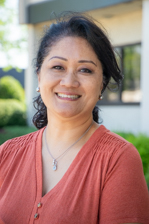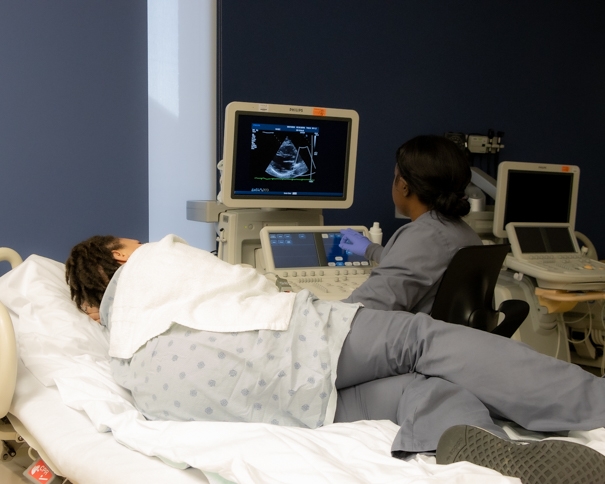Upcoming Cardiovascular Technology Programs Start Date:
May 19, 2025
(Application Deadline: March 13, 2025)
Cardiovascular Technology (CVT) consists of multiple specialties within the profession: invasive cardiovascular technology, adult echocardiography, pediatric echocardiography, non-invasive vascular technology and cardiac electrophysiology.
Cardiovascular Technology Specialties
Cardiovascular Technology applicants can choose between Cardiovascular Technology Program with Adult Echocardiography Specialty (ECHO) and Cardiovascular Technology Non-Invasive Vascular specialties.
Cardiovascular Technology Non-Invasive Vascular
Students of the Cardiovascular Technology: Non-Invasive Vascular Program are trained in the performance of non-invasive ultrasound testing procedures. These vascular studies provide essential information regarding the blood supply to and from the tissues of the brain, extremities, and other vital organs and indicate the degree and character of any obstruction.
Non-invasive vascular testing and diagnostic imaging can critically diagnose cerebrocardiovascular disease, neurological disorder, peripheral arterial disease and blood clots.
The Riverside Cardiovascular Technology: Non-Invasive Vascular Program was established in 2023 as a one-year certificate program. The program curriculum includes a thorough study of ultrasound physics, non-invasive vascular technology, skills laboratory time, and over 800 hours of clinical practice.
An a associate degree and current licensure or certification in a health-related field are required in order to submit an application.
Students are required to challenge the Sonography Principles and Instrumentation (SPI) exam and the Vascular Technology (VT) exam with the American Registry of Diagnostic Medical Sonography (ARDMS) prior to graduation.
Program Goal
The Cardiovascular Technology Non-Invasive Vascular program is designed to prepare competent entry-level cardiovascular technologists in the cognitive (knowledge), psychomotor (skills), and affective (behavior) learning domains for noninvasive vascular study.
Cardiovascular Technology Program with Adult Echocardiography Specialty (ECHO)
The Adult Echocardiographer performs cardiac ultrasounds, exercise and pharmacologic stress testing, and assists with transesophageal, intra-cardiac and intra-operative procedures to provide physicians with the analytical information needed for diagnosis and treatment.
The Riverside Cardiovascular Technology Program was established in 2021 as a one-year certificate program. At least an associate degree and current licensure or certification in a health-related field are prerequisites. The program curriculum includes a thorough study of ultrasound physics, Echocardiography Technology, skills laboratory time, and over 800 hours of clinical practice.
Students are required to challenge the Sonography Principles and Instrumentation (SPI) exam and the Adult Echocardiography (AE) exam with the American Registry of Diagnostic Medical Sonography (ARDMS) prior to graduation.
Program Goal
Cardiovascular Technology Program with Adult Echocardiography Specialty is designed to prepare competent entry-level cardiovascular technologists in the cognitive (knowledge), psychomotor (skills), and affective (behavior) learning domains for adult echocardiography.
Riverside is proud to offer:
- Full-time Day option consisting of one 12-week semester and two 14-week semesters (40 total weeks - 1 academic year) in addition to specified College-level prerequisite preadmission courses
- Theoretical instruction integrated with laboratory simulations and clinical experience
- Hands-on clinical experience in our modern medical centers
- Financial aid for students who qualify
- Associated with Riverside Health career planning services for current students and alumni
- Low instructor-to-student ratio
The applicant must hold a minimum of an associate degree.
Completion of a health-related program with evidence of certification or licensure, as applicable, that is active within the last five years (current active certification or licensure is not required).
Prerequisite College Courses
- Anatomy and Physiology I & II with Lab - 8 Credits
- English Composition - 3 Credits
- College Math (any 100-level or higher) - 3 Credits
- Psychology: Gen, Intro or Developmental - 3 Credits
- General or Conceptual Physics - 3 Credits
- Medical Terminology - 3 Credits
*All prerequisite courses must be completed before a formal application can be submitted and reviewed.
Preadmission Testing Requirements
- None
Other Requirements
- The applicant must be a graduate of an accredited U.S. high school with a GPA of 2.0 or higher or have earned a high school equivalency (GED) certificate.
- Cumulative college-level GPA of 2.5 or higher is recommended.
- Associate’s Degree
- Completion of a Healthcare Certification Program with evidence of certification or licensure as applicable that is current within the last five years.
- Prospective students for the Cardiovascular Technology, Adult Echocardiography Specialty or Non-Invasive Vascular, with prior criminal offenses are urged to review the American Registry for Diagnostic Medical Sonographers (ARDMS) Compliance Policies and/or contact ARDMS to verify eligibility for obtaining credentials.
*Students currently enrolled in a health-related program may submit an application provided they are in good standing and expected to graduate before the first scheduled day of the Cardiovascular Programs.
Class Times
Day Division
- Approximately 12 months (40 total weeks - 1 academic year)
- Hours vary Monday through Friday, 6:30 a.m. - 4:30 p.m.
- Occasional evening & weekend hours may be required
Cardiovascular Technology Programs
- Program Hours —Theory —210 hours
- Program Hours — Skills Lab — 90 hours
- Program Hours — Clinical — 855 hours
- Total Program Hours — 1155 hours
PROGRAM ACCREDITED BY
The Cardiovascular Technology – Adult Echocardiography Specialty is accredited by the Commission on Accreditation of Allied Health Education Programs (caahep.org) upon the recommendation of Joint Review Committee on Education in Cardiovascular Technology.
The Cardiovascular Technology – Non-invasive Vascular Specialty is accredited by the Commission on Accreditation of Allied Health Education Programs (caahep.org) upon the recommendation of Joint Review Committee on Education in Cardiovascular Technology.
- Commission on Accreditation of Allied Health Education Programs
9355 113th St N, #7709, Seminole, FL 33775
727-210-2350
caahep.org
CREDENTIALING
Students are required to challenge the Sonography Principles and Instrumentation (SPI) Examination and the Adult Echocardiography (AE) Examination with the American Registry of Diagnostic Medical Sonography (ARDMS) prior to graduation. Further information may be obtained from:
- American Registry of Diagnostic Medical Sonography (ARDMS)
1401 Rockville Pike, Suite 600, Rockville, MD 20852
800-541-9754
FAX 301-738-0312
www.ardms.org - INSTITUTIONAL CERTIFICATION:
Certified by the State Council of Higher Education (SCHEV) to operate in Virginia.
SCHEV
101 N. 14th Street, James Monroe Building
Richmond, VA 23219
804-225-2600
www.schev.edu - INSTITUTIONAL ACCREDITATION:
Accrediting Bureau of Health Education Schools (ABHES)
6116 Executive Blvd, Suite 730
North Bethesda, MD 20852
703-917-9503
www.abhes.org - RIVERSIDE REGIONAL MEDICAL CENTER ACCREDITED BY:
DNV GL - Healthcare
400 Techne Center Drive Suite 100
Milford, OH 4515
www.dnvglhealthcare.com
Clock-hour based program ($12 per clock hour) – 1155 total clock hours
Total Tuition: $13,860
Total Fees (post enrollment): $600
Other associated costs:
• Application & Pre-Enrollment Fees
• External Service Provider Fees (i.e. CastleBranch, CPR)
• Book estimate $575
• Uniform & shoe estimate $150
• Supplies estimate $50
• Credentialing Exam estimate $0 - 1st attempt included in tuition
See the College Catalog for a full description of all Fees & Expenses per program.
STUDENT LEARNING OUTCOMES
1. Students will be clinically competent.
- Students will perform cardiovascular exams and accurately complete preliminary report.
- Students will recognize normal from abnormal cardiovascular exams.
- Students will appropriately respond to emergent situations.
2. Students will demonstrate communication skills.
- Students will identify the diversity of patients and communicate appropriately.
- Students will demonstrate respectful written and oral communication with patients, members of the care team, and their peers.
3. Students will implement critical thinking skills.
- Students will integrate the individual needs of each patient based on their medical history and physician’s order into the study being performed.
- Students will incorporate their knowledge of ultrasound and cardiac pathology by modifying study being performed as required by protocol.
4. Students will model professionalism.
- Students will participate in the care of the patient as a member of a collaborative healthcare team.
- Students will display professionalism in relationships with physicians, team members, and the public.
- Students will display ethical behavior and comply with patient privacy laws.
Meet the Faculty

Cheralynn Chambers
Assistant Dean of Cardiovascular Technology

Jennifer Clifton
Instructor - Vascular

Dahlia Norman
Instructor - ECHO
